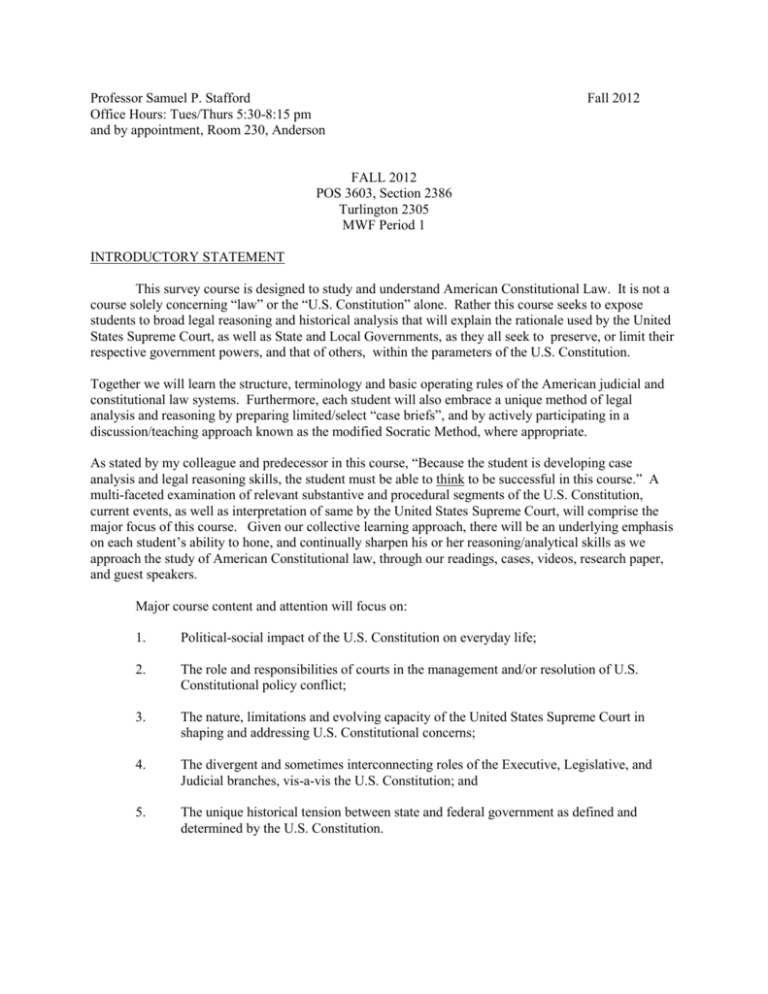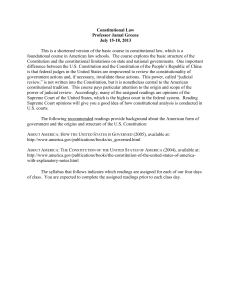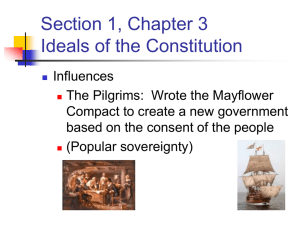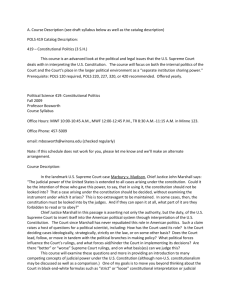Professor Samuel P. Stafford Fall 2012 Office Hours: Tues/Thurs 5
advertisement

Professor Samuel P. Stafford Office Hours: Tues/Thurs 5:30-8:15 pm and by appointment, Room 230, Anderson Fall 2012 FALL 2012 POS 3603, Section 2386 Turlington 2305 MWF Period 1 INTRODUCTORY STATEMENT This survey course is designed to study and understand American Constitutional Law. It is not a course solely concerning “law” or the “U.S. Constitution” alone. Rather this course seeks to expose students to broad legal reasoning and historical analysis that will explain the rationale used by the United States Supreme Court, as well as State and Local Governments, as they all seek to preserve, or limit their respective government powers, and that of others, within the parameters of the U.S. Constitution. Together we will learn the structure, terminology and basic operating rules of the American judicial and constitutional law systems. Furthermore, each student will also embrace a unique method of legal analysis and reasoning by preparing limited/select “case briefs”, and by actively participating in a discussion/teaching approach known as the modified Socratic Method, where appropriate. As stated by my colleague and predecessor in this course, “Because the student is developing case analysis and legal reasoning skills, the student must be able to think to be successful in this course.” A multi-faceted examination of relevant substantive and procedural segments of the U.S. Constitution, current events, as well as interpretation of same by the United States Supreme Court, will comprise the major focus of this course. Given our collective learning approach, there will be an underlying emphasis on each student’s ability to hone, and continually sharpen his or her reasoning/analytical skills as we approach the study of American Constitutional law, through our readings, cases, videos, research paper, and guest speakers. Major course content and attention will focus on: 1. Political-social impact of the U.S. Constitution on everyday life; 2. The role and responsibilities of courts in the management and/or resolution of U.S. Constitutional policy conflict; 3. The nature, limitations and evolving capacity of the United States Supreme Court in shaping and addressing U.S. Constitutional concerns; 4. The divergent and sometimes interconnecting roles of the Executive, Legislative, and Judicial branches, vis-a-vis the U.S. Constitution; and 5. The unique historical tension between state and federal government as defined and determined by the U.S. Constitution. POS 3603 Fall 2012 REQUIRED READINGS AND MATERIALS William Peden, Thomas Jefferson’s Notes on the State of Virginia, (Chapel Hill) Lee Epstein and Thomas G. Walker, Institutional Powers and Constraints 5th Edition, 2005 (CQ Press) (Photocopied cases, readings, interpretive materials.) COURSE REQUIREMENTS 1. Each student will complete all required reading assignments, brief cases prior to each class meeting, and be prepared to discuss the cases/readings. 2. Each student will be expected to read and thoroughly digest the Articles and the Amendments to the United States Constitution. 3. There will be two (2) major examinations: a midterm and a cumulative final exam. All major exams will only be given during the semester. 4. There will be several, announced and unannounced quizzes during the semester. These quizzes cannot be made up or taken again. In addition, each student must prepare and complete several short-answer assignments. 5. During the semester each student, or small group of students, will prepare a short written assignment(s) and/or class presentation(s) on particular provisions of the U.S. Constitution, and/or relevant current events. 6. One research paper (27 pages) will be assigned during the semester. The research paper must be turned in on time, or there will be a corresponding reduction in the grade earned by the research paper for each calendar day the paper is late; or the paper may NOT be accepted. 7. Due to the nature of the course, class attendance and participation is mandatory, and will count toward your final grade. There will be a heavy emphasis on student-teacher interchange and class discussion. 8. Class participation/attendance, assigned research paper, (class project?), quizzes, short-written assignments, etc., will reflect about 35% of the student's final grade; the midterm will count about 25%; while the cumulative final examination will comprise approximately 40% of the total grade in this course. 9. Each student has the individual responsibility to read, comprehend and fully comply with all requirements of the course as listed on the course syllabus and any additional ones made in class. 10. Each student is invited to consult with the professor prior to dropping or withdrawing from the course. This is an important requirement.











